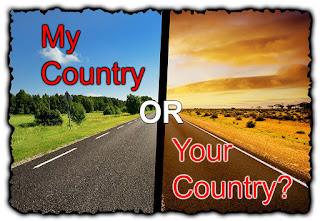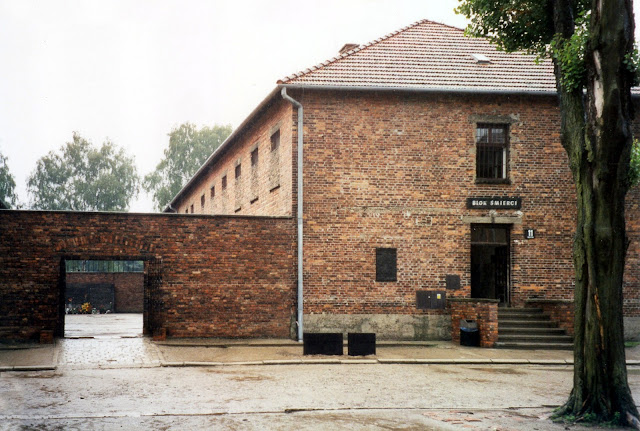My country or your country?

I was born in the UK, have lived in the USA and now made my home in Cyprus. Currently, as of 15th March 2019, I enjoy EU citizenship and UK citizenship and have applied for Cyprus citizenship. My primary loyalty is to the EU and to Cyprus, my British citizenship is a result of my birth.
As a young person I remember the South Africa apartheid issue. I remember the boycotts of South African products and companies that invested in South Africa. I'd never been to the Republic of South Africa. I had, at that stage, no relatives or friends who lived there, yet I felt I had a right to engage with what was happening there, albeit remotely.
Recently I have engaged with people from the USA over what is happening there… We have more guns per head or population in Cyprus compared to the USA yet radically less gun crime, school attacks and similar. The USA NRA are correct when then say 'guns don't kill people, people do'. And discussion about Trump.
The UK held a referendum over Brexit. Because it was legally structured as countrywide opinion poll rather than a legally binding referendum, the result, which would have been annulled due to corruption and cheating, was accepted. I'm extremely angry about it. EU citizenship matters to me.
Some people disagree with me and have said I should not get involved because I no longer live in the UK. Had there been a way to retain EU citizenship for me, my family and the friends who valued it, I might have shrugged and let them get on with it. When I get Cyprus citizenship, assuming I do get it, then the actions of the UK as a country will be a whole lot less relevant to me personally.
Is the UK 'my country' or 'your country'? Certainly for many of us who live in countries other than our birth country we tend not to talk about 'my country' but about my 'passport country'. My 'home country' is where my home is, not where I was born.
We live in a shrinking world but despite this the concept of 'country' seems still relevant if confused.
The thoughts that have been coming to me is about what right we have to engage in the decisions of other countries? If a country wishes to commit economic suicide, should we let it? If a country wishes to abuse its citizens, should we let it?
A CITIZEN OF THE WORLD…
…if you believe you’re a citizen of the world, you’re a citizen of nowhere. You don’t understand what the very word ‘citizenship’ means.
Prime Minister Theresa May, Conservative Party Conference, 05 October 2016
I am not an Athenian or a Greek, but a citizen of the world.
Socrates - As quoted in Plutarch's Of Banishment
If we see ourselves as global citizens, are we in reality 'citizens of nowhere' as Theresa May claims? Or are we actually saying humanity matters. All humanity matters.
Democracy is one of the universal core values and principles of the United Nations. Respect for human rights and fundamental freedoms and the principle of holding periodic and genuine elections by universal suffrage are essential elements of democracy. These values are embodied in the Universal Declaration of Human Rights and further developed in the International Covenant on Civil and Political Rights which enshrines a host of political rights and civil liberties underpinning meaningful democracies.
Office of the High Commissioner, United Nations Human Rights
How human communities and societies organise themselves should be up to each community or society. How they gather together in larger structures, be they states and federations, or countries and meta-national institutions like the EU, again should be up to each community or society.
DEMOCRACY… DOES IT WORK?
There are two problems:
- If the community and society is divided so that it is close to 50:50, for instance as was the case over the Brexit referendum, then a democratic vote doesn't work because close to half the population are dissatisfied with the result
- If there is a very significant majority, for instance with the vast Muslim majority in Egypt compared to the small Christian minority, then the minority can become abused
The problem with winner takes all is that it creates a win-lose scenario. The problem with compromise is that it creates a lose-lose scenario. What we should be seeking is a win-win solution.
For instance Andrew Carnegie puts it like this:
Teamwork is the ability to work together toward a common vision. The ability to direct individual accomplishments toward organizational objectives. It is the fuel that allows common people to attain uncommon results.
A COMMON VISION
However, there is an assumption there which is not true in every context… 'to work together toward a common vision'. What if there is no common vision? For instance, Theresa May has said on 30 June 2016 when she was running for premiership of the UK…we will strive to make Britain a country that works for everyone – regardless of who they are and regardless of where they’re from
The assumption there is that people have a common vision that what they want is a country and hence creating a country that works for everyone is something that will bring people together. But for a significant number of people the vision is not a country, but a supranational union, therefore the country cannot be a unifying value whether or not it works for everyone; the country is not the vision.
 Therein lies the divide… coming together or splitting? Capitalism or communism? There are many polar opposites in our political world…
Therein lies the divide… coming together or splitting? Capitalism or communism? There are many polar opposites in our political world…
And frankly I don't see that as resolvable. Win-win only works if people are heading in approximately the same direction but with different approaches to achieving that common vision. If the vision is not only different but the opposite direction I cannot see how that can work.
It's not so much my country or your country, but my country or our world…
Where there is no vision, the people perish
Proverbs 29:18It's often quoted that people perish without vision. But the issue is frequently not lack of vision but contradictory or opposing vision. It is irreconcilable a country centric vision and a supranational centric vision. That doesn't mean that people necessarily losing love of country as Guy Verhofstadt has frequently said, but the key work in the previous sentence is 'centric' - where is the centre of our vision, and those I believe to be different and irreconcilable.
THE TOWER OF BABEL
Let's not get too hung up on the veracity of the 'Tower of Babel' but look at the underlying concept. That is… people were working together towards a common vision and ended up being split into separate languages and culture groups. The European Union is in many ways the reverse of this… people with separate languages and cultures coming together towards a common unifying vision, not of competing but of being a blessing to each other and the world. Therein lies the divide… coming together or splitting? Capitalism or communism? There are many polar opposites in our political world…
Therein lies the divide… coming together or splitting? Capitalism or communism? There are many polar opposites in our political world…And frankly I don't see that as resolvable. Win-win only works if people are heading in approximately the same direction but with different approaches to achieving that common vision. If the vision is not only different but the opposite direction I cannot see how that can work.
It's not so much my country or your country, but my country or our world…




Comments
Post a Comment